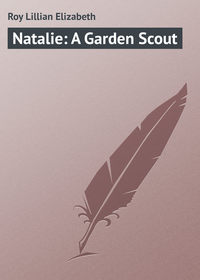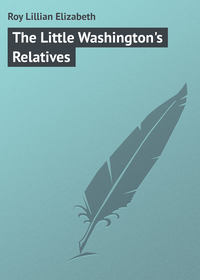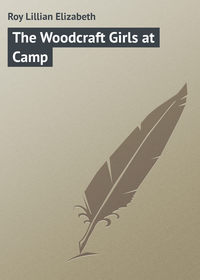 полная версия
полная версияPolly in New York
“Now they keep lots of photographs, just like these two, which they buy from cheap photographers. They buy a hundred in a job lot, and if they want a picture and can’t secure a legitimate one, or a snap-shot from the reporter’s kodak, they use what they have on hand.
“It would be extremely amusing to be present when these girls see their faces in the paper. It will prove almost as funny as seeing you two girls scorning these strange faces.”
But Mr. Maynard had been reading the article while Anne had explained the methods of many newspapers, and now he exclaimed: “By jove! Dalken never said a word about all this life-history!”
“What’s that, Daddy? Read it to us,” begged Eleanor, eagerly.
“Why – wh-y-y – the young rascal hit it right on the head, all right! But where did he get it?” continued Mr. Maynard.
“For pity’s sake – read it aloud!” commanded Eleanor, hardly able to hold her tongue about the story.
Then Mr. Maynard read it, and it lost none of its vivid coloring by his reading, either. When he had almost concluded, Polly began to grow angry. When he finished, she was furious.
“I’m going up to that office and I’ll fight that reporter. He had no more right to print that than those other men had to use someone else’s photographs and call them ours. So there!”
Mr. Maynard had been thinking seriously, and now he nailed Eleanor with a penetrating look. “Nolla, did you tell that young rascal this story when you ran to the door with his pencil and paper last night?”
“No, indeed! I did not, Daddy! You can ask the butler if I ever did! He stood right there when I handed Dunlap the pencil!”
Eleanor’s denial was so emphatic that everyone believed she was innocent of any such plot; so they never found out who was the guilty one.
While at breakfast, the telephone rang. “This is Mr. Latimer, Anne. We have just read the papers and were so surprised! When we saw the pictures of the two heroines, we feared some dreadful thing had happened to distort their faces so that we failed to recognise them, and I hastened to inquire. Do you need Dr. Evans’ services to straighten out those faces?”
An amused laugh could be heard over the wire, and Anne laughed back. “No, thanks; a good night’s rest has brought back their natural looks. The faces in the paper must have been taken by the flickering flame of the burning dwelling.”
“Jim and Ken came home late last night for the Holiday. We wanted to congratulate you girls on trying so hard for the Carnegie Medal, but now Jim wants to say ‘good-morning.’”
In another moment, Jim’s voice was heard speaking. “Oh, good-morning, Anne. Have you used Pears Soap?” Then a gay laugh.
“We have, but you haven’t! Your father just told me you got in at midnight, and if you’re up as early as this, I’m sure the sleep hasn’t been washed from your eyes,” retorted Anne.
Polly and Eleanor crowded close and hung over the ’phone so they could hear what Jim had to say.
“I only wanted to say, I’ve got tickets for the show, to-night, and the girls are not to go anywhere else.”
“Oh, tell him we’re out of town on a week-end party,” Eleanor whispered, hurriedly to Anne.
“Are the tickets good for Eleanor’s father and my mother, in case the girls go out of town?” teased Anne.
“Say – you really don’t mean that?” Jim’s voice sounded very sad.
“I cannot tell a lie – I am like George, you see, and I’ll let the girls fib for themselves,” laughed Anne, getting up from the stool and handing the instrument to Polly.
“Oh, here, Nolla! You do it! You know I don’t like this jiggery quivery thing!” cried Polly, quickly placing the telephone apparatus on the table and making room for Eleanor on the chair.
Eleanor was delighted to talk with Jim, and she kept at it until a clicking in her ear notified her that someone wanted to get them on the wire, so she hurriedly rang Jim off.
“Hello!” called Eleanor to the next inquirer.
“Hello – 1234 Madison Square?”
“Yes.”
“This is Mr. Ashby speaking. Is this one of the heroines?”
“Oh, Mr. Ashby! Yes, it is Nolla. What do you think of the story in the paper – and the funny photographs?” laughed Eleanor.
“I laughed myself sick over it at breakfast. My wife and I wondered how that young rascal got them, and James explained.”
Here Eleanor turned white, for she wondered if the butler really had seen her wink at Dunlap. “My, but I’m thankful I got at this wire instead of Anne,” said she to herself.
“Two of our maids had their postal-card pictures taken the other day, and upon rushing out of the front door to watch the fire last night, they laid them upon the hall table. James saw them there, later, but thinking the girls would soon be coming in to take them upstairs, he did nothing about it.
“Then in the excitement of watching Miss Polly climb the front of the house, and have the Chief carry her over to our house, the pictures were completely forgotten. As the young reporter went out, James saw Miss Eleanor take his hat from the stand and hand it to him. But nothing was thought about the cards. Later, however, they were gone.
“This morning the papers have the photographs of Mary, the waitress, and Gladys, the upstairs girl, as heroines of the fire. Maybe our maids are not tickled to pieces to find themselves so famous.”
Eleanor heard both Mr. and Mrs. Ashby laughing merrily over the mistake, and then she said: “Do you suppose I handed the cards to Dunlap when I picked up his papers and hat?”
“Undoubtedly. But the joke is, he thinks you meant to do it very secretly, you see, so he never mentioned it but hurried the work on the pictures so as to have them in the morning’s paper. He most likely believes that that was why you ran after him – to manage to give him those two photographs to use. I think the laugh is entirely on him, don’t you, Eleanor?”
But Eleanor did not say. She sat and studied the pattern in the rug for a time, refusing to answer all the questions asked. Then she decided that Mr. Ashby must have heard from Dunlap that morning, and was told how she had added many facts to Mr. Dalken’s story. But this funny error of using the maid’s photographs, was retribution on her head.
The young people, with Anne to chaperone them, enjoyed the play that night, and then the boys outlined the programme they had made for the week.
The next day, being Thanksgiving, the entire party was to dine at the Latimers’. Then they would go for an automobile drive, and in the evening all would enjoy an impromptu supper and dance at the Evans’.
Friday morning the boys would take the girls skating at St. Nicholas Rink. They begged to attend Mr. Fabian and the girls in the afternoon at the Textile Exhibition, then dinner at the Studio, and another play at night.
Saturday morning the girls were going to visit Mr. Ashby’s famous decorating establishment, and get a glimpse first-hand of what a modern decorator must do and know to succeed. In the afternoon the boys wanted to take in a matinee, but the girls were invited to dinner at the Ashbys, and to spend the evening with their daughter Ruth. So Jim said nothing, but he instantly planned how to meet the Ashbys.
“Now don’t go and make any more dates for next week, without asking us, understand!” declared Jim, when he heard that Saturday was engaged and Sunday, partly so.
“How can we help it if our parents and chaperones do it without our knowledge,” queried Eleanor, innocently.
“Well, I’ll speak to them, then. Ken and I will have to be off again next week; so for the few days we have at home we want you girls to pass up all other fun. You’ve got all the year for other beaux, you know,” grumbled Jim.
Polly and Eleanor laughed. “Oh, yes,” said the latter, “we just keep on the go continually, every afternoon and evening, with a devoted swain each day to replace the ones of the day before.”
“Where do you meet them?” demanded Jim, jealously.
“We-ll – the first one Polly and I snared, we ‘picked up’ at an art sale. But we have many opportunities to meet others, you know.”
“Yes,” added Polly, entering the joke, “at night school, you know, there are loads of young men; and at lectures and exhibitions – and everywhere.”
“Is that why you both are so crazy to go to these dry lecture affairs?” jeered Kenneth, thinking himself very clever, indeed.
But they failed to get the girls to break the engagement with the Ashbys, and Jim barely managed, through his father’s kind auspices, to meet Mr. Dalken Saturday morning, and thus open the way to call on the Ashbys that evening.
Mr. Dalken was young in spirit if not in years, and he enjoyed helping the two boys work out the little plot so as to be present with Polly and Eleanor at the Ashbys, that evening. But the boys never knew that their benefactor passed up an exciting game of chess at his club, that Saturday night, in order to introduce them to his friends.
There were so many wonderful things to do during that Holiday Week, that the girls could not attend them all. Many of their school-friends were eager to have them at teas and parties and matinees, but all these had to be refused with regrets. Eleanor remarked: “Wait for school to open. We’ll be the most popular girls there. In fact, every last girl will want to fag for us!”
“Why?” asked Polly, wonderingly.
“Because they think we are in such demand, everywhere, that we can’t accept any invitations of theirs. Don’t you suppose they have told each other? Lots of those girls travel around together, and they talk everything over. But I guess they are wondering who takes us out so much, and what society we travel in.” Eleanor laughed.
Polly looked at her with pity. “Nolla, sometimes I feel so sorry for you! All your joy and pleasure in having others act nice or kind to you, is lost because of the education you’ve had in Bob’s school. Now I don’t believe those girls ask us just to cater to us because we are popular. I think they really like us and would love to have us with them. If I wasn’t so frightfully busy with school at night, and other worth-while occupations, I’d jaunt about with them.”
Eleanor said nothing more, but she did a lot of thinking.
CHAPTER IX – POLLY’S MUSCLE
Mr. Maynard was delighted with Eleanor’s evident improvement in health, and all fears of the New York climate vanished entirely, before he finished his visit in New York. He remained a week and then said good-by, reminding Mrs. Stewart that she had invited him for the Christmas Holidays. They all laughed because he was welcome, at all times, to remain as long as he could.
Regular studies began again after the Thanksgiving Holiday and, with the reopening of the classes, the girls started in on a new line of art at Cooper Union. Anne Stewart used to escort the girls to and from the school on class-nights, but it was such a tiresome trip for her to make, after a hard day at school, and with lessons to go over at home, that the girls insisted upon her staying home.
Mr. Fabian generally conducted them home after class, and then went on to his own rooms. As it was hardly dark by seven-thirty, in October and early November, it was no more hazardous for the two girls to walk or ride down to the Square than it would be in the daytime.
But the days were becoming so much shorter after Thanksgiving, that it was quite dark by six o’clock. Hence Anne worried about their going downtown, alone, even though it was but a few blocks.
The second week of class in December, found Mr. Fabian absent. He had taken a severe cold and thought better of risking his health in the bitter wind and Scotch mist that night.
Polly and Eleanor did not speak of it to Anne, as she, too, felt wretched that day; and they would rather have stayed at home than have had her accompany them to night school in her state of health.
“You’re not to worry about us, Anne, if we do not come in as early as usual,” said Eleanor, upon opening the door to go out.
“Why – where will you be?” asked Anne, instantly.
“Exams. Some of the teachers are testing us in all the work we did this last term, and we have to write our answers. We may be a full hour later than usual; but we’ll come uptown, together, so there’s nothing to worry about,” explained Polly.
Anne thought she meant Mr. Fabian by “we-all” but Polly meant several of the students who lived a few blocks north of the Square.
Both girls were well bundled up in heavy storm coats, mufflers, and close-fitting woollen caps pulled down over their ears. Besides their books and other materials, they had umbrellas to carry but it was too windy to open them.
The examination questions proved to be most interesting; and the answers required a great deal of careful thought, before describing the various types, methods and ideals of architecture and decoration.
Polly described at large such questions as: “Can you describe the different types that go to make up the Egyptian people?” or the question: “How does plant-life affect Egyptian ornament – sketch two such plants.”
“What is a torus molding? Where is echinus molding used? Sketch the cyma recta.”
When Polly found the questions: “Describe a scarabæus,” and “Why did ancient Egyptians prepare their dead as they did, and describe a mummy and the methods used for its preservation,” she was elated, for she had made a particular study of these subjects at the Metropolitan Museum where the collection of Egyptian antiques is unsurpassed.
There were many other interesting questions, all of which Polly was eager to answer, but time was too limited for her to say all she wished to. For instance, she wanted to describe, at length, Greek art and the Greek nation that was characteristic for its own type of art and ornament.
She was anxious to tell what she knew about color and its importance in art. Of polychromy and what it was. In fact, she needed hours in which to speak fully of the difference between Greek, Egyptian and Assyrian art and ornament.
Eleanor on her part, wrote graphically of the difference between the Arabs and Persians, and how their modes and habits had a corresponding effect on art. She liked to describe the style of Romanesque art and how it governed all Eastern Europe at one time.
Eleanor leaned to the Moorish classics and had a weakness for Turkish designs; she loved the warm coloring used by the Moors in their work, and the harsh bright colors employed by the Turks. She had no hesitation in selecting from samples shown, the Mohammedan designs, the Chinese, the Byzantine, or Arabian patterns. She was expert in stating why the fall of Rome affected all art in Eastern and Western Europe, and what was its highest development and its period of all architecture.
It was more than an hour later than usual, when the two girls put away their work and started out for home. The scholars who lived on streets uptown, had gone long before, and Polly and Eleanor found that the high wind made it impossible for them to open their umbrellas.
“It’s so icy we will have to use them as props,” laughed Polly.
“My! But this sleet in one’s face is cold, isn’t it?” gasped Eleanor.
“Let’s take a short cut across the Plaza,” suggested Polly, breaking into a run across the diamond that separates the streets at Third and Fourth avenues, and Eighth street.
Having reached the small oasis about the subway station, Eleanor said: “Why not take the subway, here, to Twenty-eighth street, Poll?”
“Oh, I hate those subways! This wonderful sleet and the quiet hissing of the ice on the windows and walks makes me feel as if I were home. No clatter of wheels, no shouting of burly men, no nothing that makes a city so horrid. Let’s walk all the way home.”
“All right,” laughed Eleanor. “I’m game!”
So they started up Fourth avenue, past Wanamakers, and were soon lost to their surroundings in their discussion of the examinations.
“What answer did you give to the question ‘Tell the basis of religions existing with the Persians and the Arabs: describe the differences,’ Polly?”
“I was not quite sure of that, Nolla, but I did make a good thing of that question ‘Why did Egyptians use bright colors in art?’ And also that question that read: ‘When colors of the pattern contrast with the colors of the back-ground, what general rule must govern?’ You know, I just love to ferret out these ideas.”
“So do I. But I never dreamed there was so much wonderful knowledge to be obtained in a course of this kind,” said Eleanor, holding her arm before her face in order to speak distinctly.
They had now reached Eleventh street, and were passing a saloon still brightly lighted, in spite of Prohibition Laws. In the doorway lounged three tough-looking young men; but the red-cheeked girls scarcely saw them – they were too interested in their conversation. An empty auto stood by the curb, but no other vehicle or person was in sight.
When the girls came under the arc of light that reflected from the globes in the saloon-window, one of the flippant young men said, quite loud enough for Polly and Eleanor to hear: “I say! Ain’t them two goils peaches, though!”
His two companions laughed rudely, but the girls hastened on without a word or look. Another of the trio then said: “Betcha they’d be glad of comp’ny. I’ll try it.”
Eleanor whispered anxiously to Polly: “What time do you think it is?”
“It was almost eleven when we stopped writing. It must be nearly eleven-thirty now.”
“Pretty late for such a bad night. We’ll take the subway at Fourteenth street, Polly.”
“Reckon we’d better. Are there no policemen about these corners?”
“Not when you need one. On fine summer nights you will see them strolling about, maybe.”
The girls tittered, but instantly hushed when they heard voices directly behind them.
“Pretty evenin’ fer a walk, goils.”
No reply was vouchsafed to this remark but the girls kept right on with their customary swift gait.
“Ain’t che hankerin’ fer comp’ny?” chuckled another tough.
“Ah, come on back, fellers. What’s th’ use foolin’ wid a coupla high-brows on such a nasty night!” argued one of the three.
Polly and Eleanor fervently hoped they would go back, but the other fellow replied: “G’wan back, if yeh wants. Bill and me er goin’ to have some fun. Come on, Bill.”
Polly now glanced at Eleanor and said in a low tone: “Get a good grip on your umbrella. Thank heavens we haven’t any books or papers to carry, as we usually have.”
Then the fellow called Bill, said: “You amble up to the peacherino on the outside, whiles I take to the inside one, Andy.”
“There’s the boss’s car waiting fer nuttin. We kin give them a ride – a joy ride fer us,” harshly laughed Andy.
Bill joined in the suggestive laugh, and both girls unconsciously hastened their steps.
“No hurry, my pretties. There ain’t a cop twixt here an’ the saloon on Fourteenth street. Don’t we’se know this districk? Ha-ha!”
“Ready for a fight, Nolla!” hissed Polly, suddenly wheeling and facing the accosters.
Eleanor also turned, a second later, and both men were taken by surprise. Polly’s eyes blazed and she gave the roughs such a scornful look that it should have withered them as they stood there.
“Now you two out-laws turn-about-face and march downtown as fast as you know how!” commanded she.
“Ah, ha, Bill! I envy you your choice! She turns out to be a regerler sport. See them eyes shoot fire? Let me have a kiss, me pritty, afore Bill gits them all!” As the fellow Andy spoke insinuatingly, he stepped forward to take hold of Polly.
At the same moment her umbrella swung back over her head and the muscular young arm instantly brought down the heavy metal knob upon the soft cap that covered the head of the ruffian. The blow was so unexpected, and forceful as well, that it staggered Polly’s assailant.
Both men cursed fluently, then, and Bill threatened: “Jus’ fer dat, you’se is goin’ to get what’s comin’ to yeh!”
Eleanor wanted to turn and run, but she would not have deserted Polly for all the world, so she screamed “Help! Help!” with all her lung-power – and she had plenty of it.
Bill hesitated to attack Eleanor as she yelled and screamed for help, but Andy was raging and tried to close in with Polly. The umbrella was flung aside, and in another minute Polly launched at his face with a closed fist. It struck him between the eyes and caused a howl of pain.
Before he could collect himself, the daring girl had struck him another fearful blow under the chin. This sent him back flat upon his back, and while he was trying to crawl up on his knees, the amateur pugilist turned and sent a blow at Bill. But he had stood gaping at the amazing encounter with his pal, and he now dodged his own undoing.
Eleanor saw her opportunity. She had no time to lift her umbrella for a blow, and it had no solid handle like Polly’s, but she fiercely rammed the steel-capped end of the rod into the pit of the rascal’s stomach, so that, instantly, he buckled up. He sank down groaning while he struggled to get his breath.
Andy was up on his feet again by this time, but Bill was out of the fight, so both girls gave full attention to the second villain. He fought now, as slum ruffians will, but he was no match for the hard knuckles, steel muscles and lithe movements, of the Rocky Mountain maid who had grappled with wild animals and had won out.
The groveling Bill now managed to reach out a hand, planning to catch Eleanor by the ankle and trip her. But at that moment a silent-running automobile slid up to the curb and, at the instant of its stopping, the door flew open and a gentleman leaped out. In his hand he pointed a revolver, and Andy immediately threw up both hands.
“W-h-y – Mr. Dalken. Oh, thank goodness you came!” cried Eleanor, trembling nervously.
The chauffeur was standing guard over Bill at the same time, so Mr. Dalken asked frowningly: “What are you girls doing down here at this hour? – all alone, too!”
By this time the truant officer ran over to the group and wanted to know what was wrong. Mr. Dalken turned on him in just anger. “Wrong – why, you were not on the beat! That’s what’s wrong.”
“But I was – I got a beat bigger than any Fift’ avenoo cop what only has to parade in front of a swell’s house.”
“You needn’t try to bull-doze me, my man. Evidently you fail to recognise me, but we will talk this over at the City Hall, in the morning. Now arrest these two foot-pads.” As the officer snapped hand-cuffs on his prisoners, Dalken added, “By the way, why is a saloon open at this hour – to sell soft drinks?”
The scorn in Mr. Dalken’s tone silenced the policeman. “Now, girls, jump into the car and I will take you home,” offered their rescuer. But the officer interfered when they would have stepped inside the car.
“Your names, please, and addresses. And how do I know that you will take these young ladies to their home?” The tone of the man was insulting.
“If it were not for the fact that I want to hurry these children to their family as quickly as possible, I’d take the keenest pleasure in answering you in a manner that you’d understand and respect. Now you go about your tardy business and I will see to mine. Here’s my card. The girls do not appear in this matter at all. I am the man who caused the ruffians’ arrest, and I will answer in Court.”
Mr. Dalken followed the girls into the car and the driver instantly shot away; in a short time the car stopped in front of the Studio. As Polly and Eleanor gratefully took Mr. Dalken’s hand, he advised them. “Better not speak of this affair to anyone – leave it to me to settle. But, hereafter, do not dream of going about so late at night, unattended. One never can tell!”
“But we can’t expect Anne to trot about with us when she is tired out at night,” explained Eleanor.
“Then use my car on the nights you have to go to school. I’ll send down my Sedan, after this, because the butler understands its tricks thoroughly. He seldom has anything to do on those evenings you go to school, and he can oblige us by driving that car should I need Henri for this car.”
The girls thanked him again, and then hurried indoors.
“Where have you been so late, dears?” cried Anne, anxiously, as they came in.
“We told you we would be late,” began Polly.
“But it is past twelve, now; I was about to call up the police-station at Ninth street, and find out if anything had happened.”
The two girls laughed and Eleanor pulled Anne’s ear playfully, as she said: “Now, silly, what could happen to us!”









